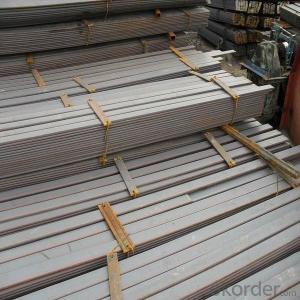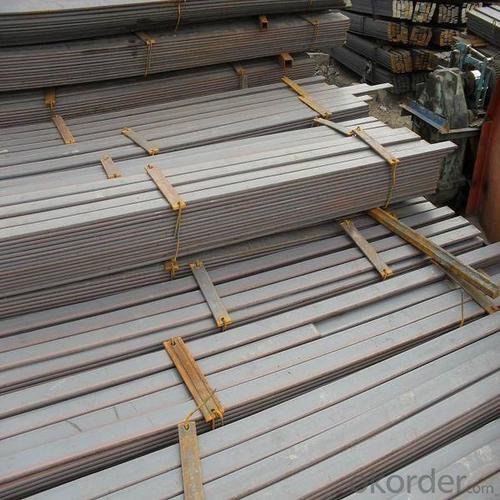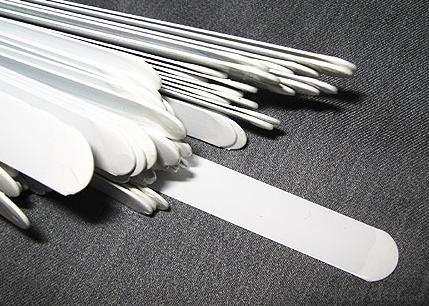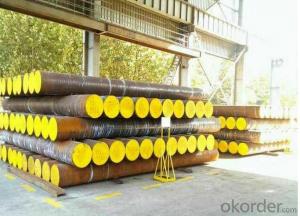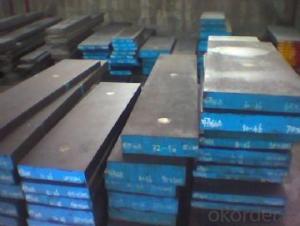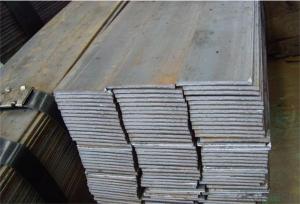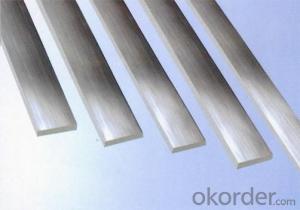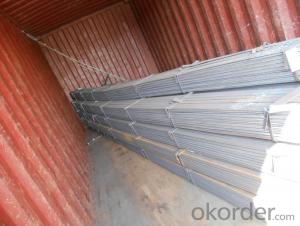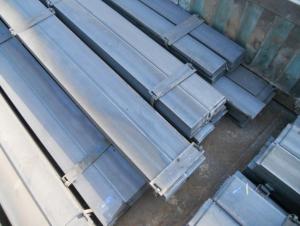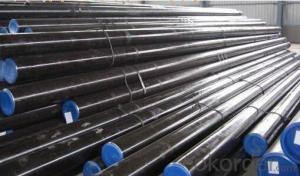Steel Spring flat bar/ JIS standartd/ Prime quality
- Loading Port:
- Shanghai
- Payment Terms:
- TT OR LC
- Min Order Qty:
- 30 m.t.
- Supply Capability:
- 800 m.t./month
OKorder Service Pledge
OKorder Financial Service
You Might Also Like
Specifications
Spring steel flat bar
Garde: 60Si2Mn, 60Si2MnA, 55CrMnA,50CrVA
Standard GB,JIS,ASTM,DIN,AISI,BS
LF & VD forge;ISO&TUV appr
Materials
Q195,Q215,Q235B,Q345B,
S235JR/S235/S355JR/S355
SS440/SM400A/SM400B
Product Category
Metallurgy,Mineral &Energy
Technique
HOT ROLLED
Packing
1.Big OD:in bulk
2.Small OD:packed by steel strips
3.woven cloth with 7 slats
4.according to the requirements of customers
Usage
Mechanical&manufacture,Steel strcuture,
Shipbuilding,Bridging,Automobile chassis
Main market
Middle East,Africa, Asia and some Uropean country and America ,
Australia
Country of origin
China
Productivity
15000 Metric Tons pet Month
Remark
Payment terms :T/T ,L/C
Terms of trade :FOB ,CFR,CIF ,DDP,EXW
Minimum order : 10 tons
Lead time :on or before 3-15 working days .
- Q: What are the different methods of surface honing for special steel?
- Surface honing for special steel can be achieved through various methods, each with its own benefits and uses. Among the commonly employed techniques are: 1. Manual Honing: This approach entails the utilization of handheld honing tools, such as stones, sticks, or abrasive pads, to manually remove material from the steel's surface. Manual honing permits meticulous control and is often suitable for smaller or intricate components. 2. Machine Honing: Machine honing involves the use of specialized honing machines that automate the honing process. These machines typically feature rotating honing stones or abrasive belts, which eliminate material from the steel's surface. Machine honing is favored for larger or complex parts, as it ensures consistent and high-quality outcomes. 3. Diamond Honing: Diamond honing relies on diamond abrasives to eradicate material from the special steel's surface. Given that diamond is one of the hardest substances known, it is exceptionally effective for honing steel. This method is commonly employed in high-precision applications or instances where an exceedingly smooth surface finish is required. 4. Superfinishing: Superfinishing is a specialized honing process that achieves extremely fine surface finishes on special steel. It combines honing stones and abrasive pastes to remove minuscule amounts of material from the surface. Superfinishing is typically utilized in critical applications where surface roughness and dimensional accuracy are of utmost importance. 5. Lapping: Lapping is a honing method that employs a combination of abrasive particles and a rotating or vibrating tool to eliminate material from the steel's surface. It is particularly suitable for parts necessitating a very flat or parallel surface, such as bearings or sealing surfaces. 6. Electrochemical Honing: Electrochemical honing is a specialized process that employs an electric current to remove material from the special steel's surface. It is often employed for intricate or hard-to-reach surfaces, as it effectively eliminates material from areas inaccessible to other honing methods. To sum up, the various methods of surface honing for special steel encompass manual honing, machine honing, diamond honing, superfinishing, lapping, and electrochemical honing. Each method offers distinct advantages and applications, enabling precise control and the attainment of desired surface finishes and dimensional accuracy for special steel components.
- Q: How is special steel used in the packaging supply chain?
- Special steel is used in the packaging supply chain for various purposes such as manufacturing machinery, tools, and equipment needed for packaging processes. It is used to create durable and reliable components like blades, cutters, and molds, ensuring precise and efficient packaging operations. Additionally, special steel can be utilized for constructing robust packaging materials like containers, pallets, and racks, providing strength and stability during transportation and storage.
- Q: What are the different automotive grades of special steel?
- In the automotive industry, various grades of special steel are utilized. Specifically tailored to meet the unique requirements of this sector, these grades offer a wide array of options. Some commonly employed grades encompass: 1. Advanced High-Strength Steels (AHSS): Renowned for their exceptional strength and remarkable formability, AHSS is employed in critical automotive components such as chassis, body panels, and safety systems. This utilization enhances crash performance while simultaneously reducing weight. 2. Dual-Phase Steels (DP): DP steels, a subcategory of AHSS, provide a combination of high strength and good ductility. They find common use in automotive applications necessitating both strength and formability, such as structural components and reinforcements. 3. Martensitic Steels: Distinguished by their high strength and hardness, martensitic steels are frequently utilized in automotive applications requiring resistance to wear and impact. Examples include crankshafts, gears, and axles. 4. Transformation-Induced Plasticity (TRIP) Steels: TRIP steels are designed to offer high strength, excellent formability, and superior energy absorption during impacts. They find application in automotive safety components like bumper reinforcements and crash boxes. 5. High-Strength Low-Alloy (HSLA) Steels: HSLA steels strike a balance between strength, formability, and cost-effectiveness. They are commonly employed in automotive structural components and suspension systems, aiding in weight reduction while maintaining structural integrity. 6. Stainless Steels: Exhibiting corrosion resistance, stainless steels are ideal for automotive applications that necessitate protection against rust and corrosion. This includes exhaust systems, fuel tanks, and decorative trims. The diverse range of special steel grades empowers automotive manufacturers with ample choices to cater to specific needs in terms of strength, formability, durability, and corrosion resistance. The selection of the appropriate grade hinges on the intended application and desired performance characteristics.
- Q: How does special steel perform in corrosive chemical environments?
- Stainless steel, also known as special steel, demonstrates exceptional performance in corrosive chemical environments due to its unique composition, which contains a high chromium content, typically exceeding 10.5%. The presence of chromium results in the formation of a passive oxide layer on the steel's surface, effectively serving as a protective barrier against corrosion. The passive oxide layer exhibits remarkable resistance to various corrosive substances, including acids, alkalis, and salts, establishing special steel as a highly reliable and durable material for chemical environments where corrosion poses a significant concern. Moreover, special steel showcases outstanding resistance to pitting corrosion, a localized form of corrosion that can arise in aggressive chemical environments. This resistance can be attributed to the inclusion of other alloying elements like nickel and molybdenum, which further enhance the steel's ability to withstand corrosion. Additionally, special steel possesses excellent strength and toughness, making it suitable for a wide range of industrial applications, such as chemical processing plants, oil and gas refineries, and pharmaceutical industries. Its capacity to endure high temperatures and pressures ensures long-term performance and reliability, even in harsh chemical environments. Nevertheless, it is crucial to emphasize that the performance of special steel in corrosive chemical environments may vary depending on the specific grade and composition of the steel. Consequently, selecting the appropriate grade of special steel specifically designed for the intended chemical environment is imperative to ensure optimal performance and longevity.
- Q: Can special steel be used in the production of springs for watches?
- Yes, special steel can be used in the production of springs for watches. Special steel, such as stainless steel or high-carbon steel, is often preferred for making watch springs due to its durability, corrosion resistance, and ability to retain its shape and elasticity over time.
- Q: How does special steel perform in high-temperature oxidation?
- Special steel performs well in high-temperature oxidation due to its enhanced resistance to heat and corrosion. It exhibits superior strength and stability, retaining its mechanical properties even at elevated temperatures. Additionally, the presence of alloying elements like chromium, nickel, and molybdenum in special steel forms a protective oxide layer that prevents further oxidation. This makes special steel an ideal choice for applications requiring resistance to high-temperature oxidation, such as in aerospace, power generation, and chemical industries.
- Q: How does special steel contribute to the performance of industrial machinery?
- The role of special steel in enhancing the performance of industrial machinery is crucial in multiple ways. Firstly, its superior mechanical properties, including high strength, hardness, and toughness, make it suitable for withstanding heavy loads, vibrations, and impact forces commonly encountered in industrial applications. This enables the machinery to operate efficiently and reliably under demanding conditions. Additionally, special steel's excellent corrosion resistance is particularly important in industries where machinery is exposed to harsh environments or corrosive substances. By preventing component degradation due to corrosion, special steel helps extend the machinery's lifespan and reduce maintenance costs. Furthermore, manufacturers can tailor special steel to specific applications through various alloying elements and heat treatments. This optimization allows for properties like wear resistance, heat resistance, or high-temperature strength to meet the specific requirements of industrial machinery. By using special steel, manufacturers can achieve higher performance levels and improve overall efficiency. Moreover, special steel offers superior dimensional stability and machinability. This ensures precise manufacturing of components, reducing the potential for errors or inaccuracies that may affect machinery performance. The machinability of special steel also allows for easier fabrication and assembly, improving the overall production process and reducing manufacturing costs. In conclusion, special steel significantly contributes to the performance of industrial machinery through its superior mechanical properties, corrosion resistance, tailorability, dimensional stability, and machinability. By incorporating special steel into machinery components, manufacturers can enhance durability, reliability, and efficiency, ultimately leading to improved productivity and profitability in various industries.
- Q: How does special steel contribute to the safety of infrastructure?
- Special steel plays a crucial role in enhancing the safety of infrastructure in various ways. Firstly, it offers exceptional strength and durability, allowing for the construction of robust and resilient structures. Whether it is used in bridges, buildings, or tunnels, special steel provides the necessary structural integrity to withstand extreme loads, such as heavy traffic, strong winds, seismic activities, or even potential terrorist attacks. Moreover, special steel possesses excellent corrosion resistance properties, making it suitable for infrastructure projects exposed to harsh environmental conditions. By preventing rust and decay, it extends the lifespan of structures and reduces the need for costly maintenance and repairs. This is especially important in coastal areas, where infrastructure is subjected to the corrosive effects of saltwater. In addition to its strength and corrosion resistance, special steel also offers exceptional fire resistance. It has a high melting point, which allows it to maintain its structural integrity under extreme temperatures. This characteristic is critical for infrastructure safety, as it provides additional time for evacuation and emergency response in case of a fire. Furthermore, special steel can contribute to the safety of infrastructure by enabling innovative design solutions. Its versatility allows for the creation of complex and efficient structures, such as long-span bridges or skyscrapers. These designs often incorporate special steel components, such as high-strength beams or columns, which enhance the overall stability and safety of the infrastructure. Overall, special steel's exceptional strength, corrosion resistance, fire resistance, and design flexibility make it an essential material for ensuring the safety and reliability of infrastructure. By utilizing special steel in construction projects, engineers and architects can create structures that can withstand various challenges, ultimately protecting the lives and well-being of the people who utilize them.
- Q: What are the different non-destructive evaluation techniques used for special steel?
- Some different non-destructive evaluation techniques used for special steel include ultrasonic testing, magnetic particle inspection, dye penetrant inspection, eddy current testing, and radiographic testing. These methods allow for the detection of internal and surface defects in the steel without causing any damage to the material.
- Q: How is corrosion-resistant steel used in marine applications?
- Corrosion-resistant steel is widely used in marine applications due to its ability to withstand the harsh and corrosive conditions of the marine environment. It is commonly used in the construction of ships, offshore platforms, and marine equipment. The steel's corrosion resistance properties help to prevent rusting and corrosion caused by saltwater, moisture, and other environmental factors. This increases the durability and longevity of marine structures, ensuring their safe operation and reducing maintenance costs.
Send your message to us
Steel Spring flat bar/ JIS standartd/ Prime quality
- Loading Port:
- Shanghai
- Payment Terms:
- TT OR LC
- Min Order Qty:
- 30 m.t.
- Supply Capability:
- 800 m.t./month
OKorder Service Pledge
OKorder Financial Service
Similar products
Hot products
Hot Searches
Related keywords
